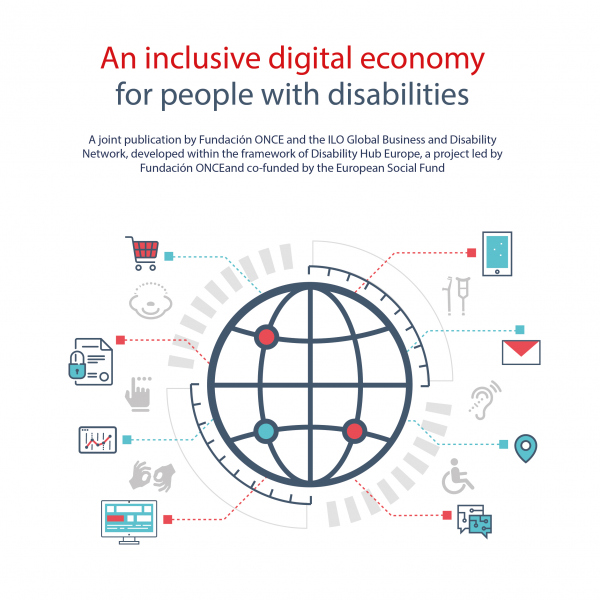On February 10, Fundación ONCE together with the ILO Global Business and Disability Network (ILO GBDN) have presented the publication “An inclusive digital economy for people with disabilities” at the Zero Project Conference 2021.
The work has been developed in the framework of Disability Hub Europe (DHub), a European initiative led by Fundación ONCE and co-funded by the European Social Fund, and builds on the publication 'Making the Future of Work Inclusive of Persons with Disabilities', developed by Fundación ONCE and the ILO GBDN in 2019.
The first publication attempted to connect different areas of a globally emerging discussion by looking at key trends of the future of work from a disability perspective. Mega trends such as the technological revolution, the demand for new vocational skills, cultural and demographic changes as well as the climate crisis were the objects of reflection. Due to the ever-increasing importance of rapidly evolving digital technologies, the leading organizations, prioritized the topic for publication recently launched. The new document takes a closer look at the digital transformation of the world of work and how it affects opportunities and challenges for the inclusion of persons with disabilities.
The presentation session at the Zero Project Conference has counted with reference actors including ILO, KPMG, ONCE Social Group, Global Apprenticeship Network (GAN), European Disability Forum (EDF) and Microsoft Ibérica.
Manuela Tomei, Director of Conditions of Work and Employment Programme at ILO, opened the session reminding that to achieve our global commitment to social justice and to the Agenda 2030, to leave no one behind it is essential to work on a disability inclusive future work.
Teresa Royo, Sustainability Director at KPMG and DHub Technical Secretariat team leader, presented the main findings of the publication. She explained that the paper identifies the main impacts of the technological revolution in the world of work and analyses the risks and opportunities they bring to people with disabilities. Teresa also highlighted that the main levers for an inclusive digital labour market identified throughout the report are:
- Ensuring accessibility for people with disabilities
- Promoting digital skills among people with disabilities
- Promoting the digital employment of people with disabilities
At the end of her intervention, she emphasized the relevance of the involvement of key stakeholders to address the challenges mentioned and break down barriers.
Moreover, Fernando Riaño, Director of Institutional Relations and Social Responsibility at ONCE Social Group, moderated the discussion with Nazrene Mannie, Executive Director of Global Apprenticeship Network (GAN), Catherine Naughton, Director of the European Disability Forum (EDF) and Carlos de la Iglesia, Communication and Corporate Development Director at Microsoft Ibérica.
During the discussion, the speakers mentioned the elements of the publication that, according to their perspectives, give more added value. Some of the comments shared were that the report contributes to create awareness of the challenges and opportunities the digital economy brings to people with disabilities, that best practices included help organizations to understand what can be done, that the complexity of digital employment is addressed, or that it is a roadmap with many guidelines and recommendations for all stakeholders.
Moreover, from GAN, Nazrene gave her advice in terms of ensuring that persons with disabilities have access to the digital skills required by the changing labour market, from the EDF, Catherine presented the key aspects in advancing towards a more inclusive digital world of work for people with disabilities in the EU and from Microsoft Ibérica, Carlos explained the role that companies in the digital sector can play to promote inclusion of people with disabilities in an increasing digital work context.
Fernando Riaño from the ONCE Social Group, acknowledged the support of the European Social Fund as a key element for the labour inclusion of people with disabilities in the EU, and closed the session with a strong message, “ability and attitude are more important than disability”, adding that “inclusion is an important pillar of the new scenario around the digital economy”.
The publication counted with the participation of more than twenty experts at international level and the leading elaboration team included Carla Bonino, Maria Tussy (Fundación ONCE), Stefan Trömel, Natalia Privee (ILO), Teresa Royo, Álvaro Rico, Andrea Collado, Cristina Irujo (KPMG acting as Technical Secretariat of Disability Hub Europe).








